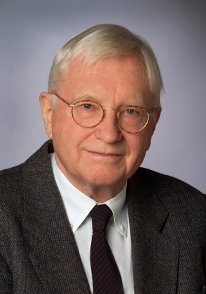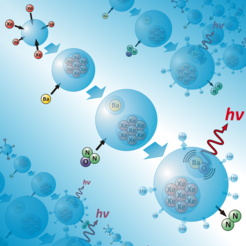A garden of physics – 70 alumni from different fields of science congratulate
Professor Dr. Dr. Jan-Peter Toennies celebrates his 85th birthday with a special symposium
Former long-standing Max Planck Director, Professor Dr Jan-Peter Toennies celebrates his 85th birthday with a special symposium. Seventy former Ph.D., Diploma and Master‘s students will gather with their former supervisor on Friday, May 15, 2015 for „A garden of physics: former students in new fields“ at their old work place on Bunsenstraße at the Max Planck Institute for Dynamics and Self-Organization in Göttingen.

„My 200 PhD students learned learning“, says 85-year-old Jan-Peter Toennies. „Some of the scientists I trained will present their own research in fields that they haven't learned from me.“ Toennies is proud of his students. He especially looks forward to the talk on „Electrospray Mass Spectroscopy of Large Biomolecules“ by his former student and current director of the Max Planck Institute for Biochemistry at Martinsried (Bavaria), Professor Dr Matthias Mann.
Jan-Peter Toennies was born on May 3, 1930, in Philadelphia as the son of German immigrant parents and grew up in a suburb outside of the city. He studied physics and physical chemistry at Amherst College and physical chemistry at Brown University where he graduated 1957 with a PhD in chemistry. From 1953 to 1954 he performed research at Göttingen University on a Fulbright scholarship. For the next decade from 1957 to 1965 he worked as a scientific assistant to Wolfgang Paul (Nobel Prize in Physics 1989) in Bonn. There he qualified as a post-doctoral lecturer („Habilitation“) and became reader (Privatdozent) in 1965. He also spent time in these years as a visiting professor for physical chemistry at the University of Gothenburg.
Jan-Peter Toennies was appointed a scientific member and director of the Max Planck Institute for Fluid Dynamics in 1969 , a position he held until 1998. After these three decades of service, he continued as the leader of the molecular beam group until 2004, during which time, the institute was re-oriented towards non-linear dynamics and re-named Max Planck Institute for Dynamics and Self-Organization.

Up to the present, Professor Toennies engages himself with investigations in fundamental interaction between atoms and molecules in the gas phase and in solids. His group was the first to gain insight into the atomic interactions leading to the superconductivity in thin lead films. Among the legacy of research he contributed to was the discovery of new quantum effects in small helium clusters and superfluidity in helium nano-droplets. Superfluidity, which only appears at a few degrees above the absolute temperature zero-point, describes the flow of a liquid without friction. It is one of the few examples of a macroscopic quantum effect.
Jan-Peter Toennies has received important national and international awards. He is corresponding member of the Göttingen Academy of Sciences (since 1990) and of the Academy of Natural Sciences Leopoldina (since 1993). In 2002 Toennies received the most recognized prize for experimental physics in Germany, the Stern-Gerlach Medal. In 2006 he was honored together with Giacinto Scoles with the Benjamin-Franklin Medal for Physics for research on stable and instable molecules in ultra-cold helium droplets that would not have been possible otherwise. Professor Toennies also has an honorary doctorate of Amherst College and of the University of Gothenburg.

